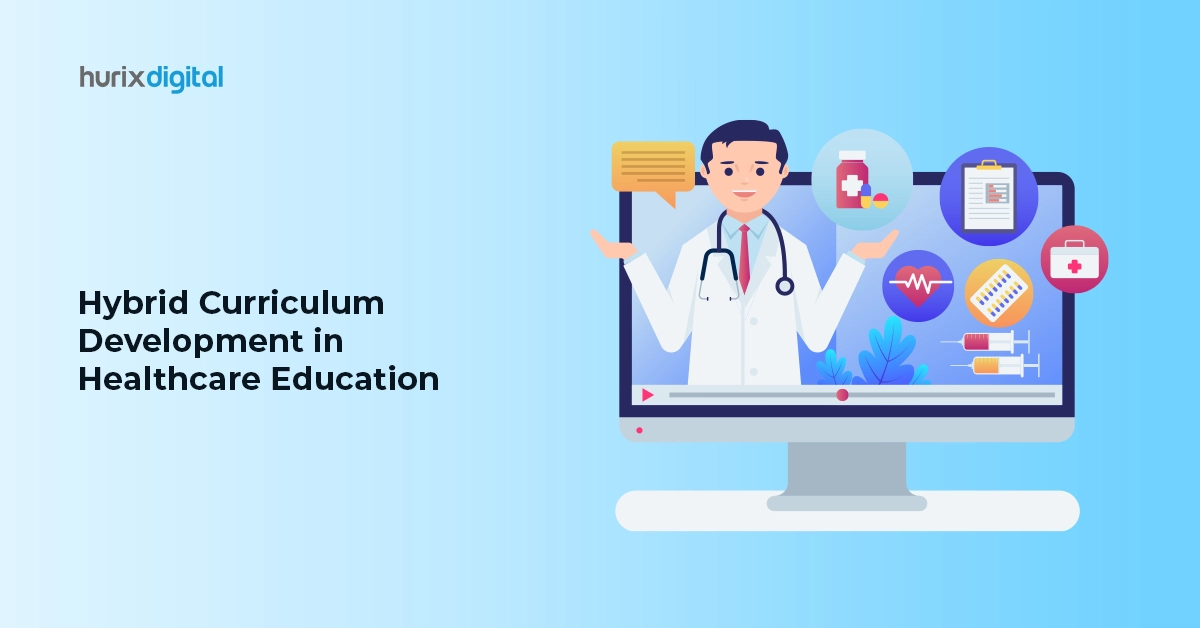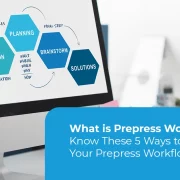Hybrid Curriculum Development in Healthcare Education
Healthcare is one of the most hands-on fields where both knowledge and practical skills are equally important.
With a low professional-to-patient ratio, the pressure to perform optimally while keeping up with evolving patient needs is constant. However, traditional medical training methods have limitations in meeting these demands.
It is essential to stay updated with the latest advances in knowledge and technological innovations. However, traditional medical training techniques and practices have limitations in helping students meet learning goals and, in turn, challenges.
This is where hybrid curriculum development can help healthcare faculty upgrade their lessons quickly and efficiently. Also known as blended learning, this methodology leverages the benefits of technology and reduces barriers to learning. It also encourages self-learning as an ongoing and structured practice.
In this blog, we will deconstruct hybrid learning in healthcare education and how it adds value to the development of agile, knowledgeable healthcare professionals. Read on!
Table of Contents:
- What is Hybrid Curriculum Development in Healthcare?
- 9 Pillars of Hybrid Curriculum Development in Healthcare
- Final Words
What is Hybrid Curriculum Development in Healthcare?
Hybrid curriculum development in the healthcare field is the process of building a learning system that combines traditional methods with tech-enabled learning methods that enhance learning effectiveness for healthcare professionals and students.
A hybrid curriculum aims to make the learning process more inclusive, intuitive, relevant, and accessible on demand to learners.
Advances in technology are revolutionizing the process for healthcare professionals in several ways.
For instance, the growing adoption of simulated learning environments enables healthcare professionals to have an immersive learning experience and build improved skills in a cost-effective, sustainable way. And, virtual reality (VR) and augmented reality (AR) technologies are increasingly being integrated into healthcare curriculum development to provide realistic simulations of clinical scenarios, surgeries, and patient interactions.
Also Read: Virtual Laboratories: Simulating Experiments in eLearning for Healthcare Sciences
9 Pillars of Hybrid Curriculum Development in Healthcare
Here’s a snapshot of how organizations can invest in building a blended learning curriculum for their professional networks:
1. A Blend of Online and Offline Learning
Due to the demands of the field, healthcare professionals have some of the most rigorous and grueling schedules across industries today.
Attending offline lectures becomes a challenge due to time restraints as well as cost factors. Hence, one of the key pillars of a hybrid curriculum is to combine traditional elements, such as lecture-style classes, with various elements of online learning.
This approach enables professionals to engage with mentors and experts worldwide, enjoy the flexibility to learn according to their schedules and sustain their learning goals.
2. Interdisciplinary Education
There is a growing demand for interdisciplinary collaboration to help enhance patient care in the healthcare industry. However, healthcare professionals often pursue disciplines in silos.
Today, there is a shift towards diagnosis and treatments that connect multiple areas of human health. Hence, curriculum development must also mirror these shifts by strengthening interdisciplinary education in healthcare.
3. Technology Integration
Effective technology integration will play a key role in enabling all aspects of contemporary healthcare training and education. Hence, organizations need tools to design the curriculum, develop it, and distribute the content securely and learner-friendly.
For instance, the adoption of an automated, Artificial Intelligence (AI) powered Learning Management System (LMS) scores over legacy LMS as it is more intuitive and efficient in meeting an organization’s training needs.
It comes with superior data analytics, an in-built digital rights management (DRM) system, and content conversion services, to name a few functionalities. Such a platform can be seamlessly integrated with existing software, and vice-versa.
4. Data-Driven Curriculum Development
Data can play a transformative role in enhancing the learning effectiveness of learners in healthcare education. A superior LMS offers superior data insights based on an in-depth analysis of learner data.
The platform can generate reports based on a learner’s performance and recommend resources instantly. Course content and assessments can be personalized for individual learners based on their level of expertise and gaps in learning.
AI-powered data analytics can also predict future performance based on historical and real-time data.
5. On-Demand Learning Resources
Enabling healthcare professionals to pursue a flexible learning schedule is a sustainable way to ensure that learning is an ongoing process. Organizations can curate expansive digital libraries of resources and design courses with on-demand resources available.
Professionals can learn anytime, anywhere, and schedule their learning around their work schedules. This is another way to ensure that learning is crafted around the schedules of healthcare professionals, rather than the other way around.
6. Multiple Content Formats
Multi-format learning is a key pillar of blended learning. It allows learners to engage with the material in ways that suit their individual preferences and lifestyles.
The focus area must be the curation of content resources to make them easy to consume. Designing programs with a mix of video and audio representations, slide shows, podcasts, quizzes, and eBooks caters to diverse learning preferences.
Rather than being forced to attend an offline lecture, a medical professional can watch a quick video or listen to a podcast to enhance their knowledge.
And when they have more dedicated time, they can explore more interactive resources like quizzes or eBooks. This flexibility not only accommodates the busy schedules of professionals but also maximizes their learning efficiency by allowing them to choose the most suitable format for their current situation.
7. Live Healthcare Simulations
Healthcare professionals require significant hands-on, practical experience to become proficient in their roles.
Access to live Augmented Reality/ Virtual Reality based healthcare simulations provides professionals with a canvas to practice and enhance their skills on an ongoing basis. This is also a more cost-effective and sustainable method to provide a live environment to professionals in the sector.
8. Mobile-first Learning Experience
Optimizing the mobile experience is another key pillar of hybrid curriculum development. The mobile learning market is projected to grow from $ 76.08 billion in 2024 to $ 230.12 billion by 2029 at a compound annual growth rate of 24.78%.
Since healthcare professionals are continuously on the move or busy with patient care, they must be able to learn from their mobiles and smart devices. Organizations must prioritize mobile learning.
9. Collaborative Learning
Healthcare professionals from diverse fields often collaborate on cases for diagnosis and treatment. Hence, collaborative skills are an important aspect of the job.
Hybrid curriculum development helps build a collaborative framework for multiple learners to collaborate on projects and enhance collaborative skills. Access to a superior LMS simplifies the collaboration process, enabling learners to solve problems, complete tasks as a team, and evaluate team skills.
Also Read: How Data Mining is Revolutionizing the Healthcare Industry?
Final Words
The smart use of technology is enabling efficient and ongoing healthcare curriculum development, which in turn enables professionals and students to stay up-to-date and competitive in their fields.
Businesses, non-profits, training institutes, and educational institutes that make early investments in tech-enabled training and education for their staff, interns, and students can gain a competitive edge.
If your organization wants to switch to an agile e-learning platform, Hurix Digital can help. Our advanced Learning Management System is available as a one-time purchase or a subscription.
Contact us to explore the best hybrid learning options for your healthcare education needs.











